Think you know keywords? Think again.
There’s a lot more to them than you might expect. Keywords come in many forms, each with its own role in SEO.
That’s why we’ve put together this article to guide you through the different types of keywords and help you make the most of them.
Without further ado, let’s explore how different keywords can help your SEO.
What are Keywords and Why They Matter in SEO?
Keywords are words or phrases you target and try to rank for on search engines.
Let’s say your company provides a photo editing solution. The keywords you will try to rank with will probably be something like “photo editing tool”, “photo editing software,” and other similar phrases, depending on your preferences and the metrics of potential keywords you want to use.
By targeting the right keywords, you can improve your site’s visibility in search results, attract more relevant traffic, and increase your chances of ranking higher. To further strengthen your SEO strategy, keyword clustering can help group related terms together, improving your content’s relevance for a broader range of searches.
11 Types of Keywords You Should Know About
Below, we’ve put together a list of the 11 types of keywords you need to understand to improve your SEO strategy and drive more traffic. If you later need to revisit any of these terms, feel free to refer to an SEO glossary for definitions.
Let’s explore!
Short Tail Keywords
Short tail keywords, also called head terms, are brief and broad terms that consist of 2-3 words.
While they have high search volumes, they’re also highly competitive, with many sites targeting the same terms.
Moreover, the search intent of these keywords is super unclear. For example, if you search ‘good cheesecake,’ Google doesn’t know if you want to bake, buy, or find the best cheesecake place nearby. So, it shows a mix of recipes, stores, and reviews.
This, however, doesn’t mean you should avoid using them. Quite the contrary. We recommend integrating them strategically to enhance content relevance and reach a broader audience.
To find short tail keywords, we use Ahrefs.
- Log in to your Ahrefs account
- Head to “Keyword Explorer” and type your target keyword (e.g. website SEO)
- Under “Terms match,” click View all to find additional keyword ideas related to your target keyword.
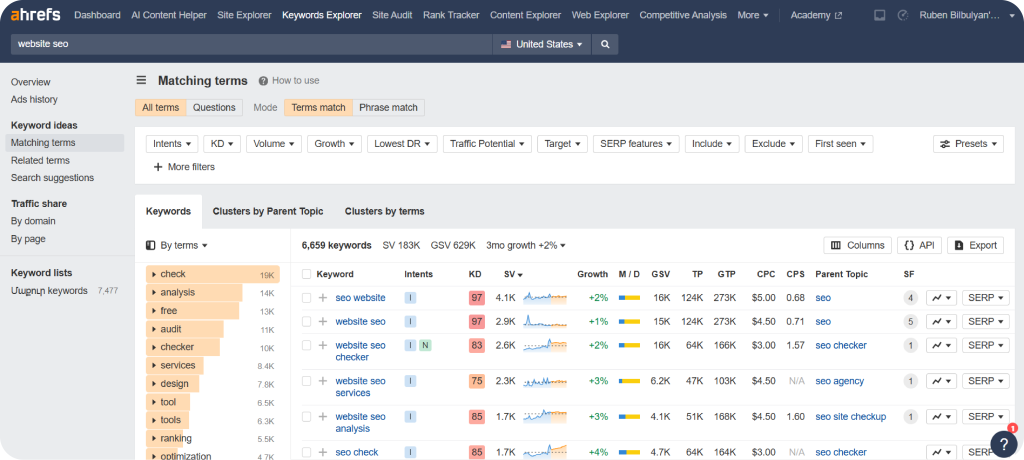
Here you can see a bunch of keywords, which can be valuable for your content.
Note: Make sure to also check out the “Also rank for” and “Also talk about” sections—they can give you even more keyword ideas to consider.
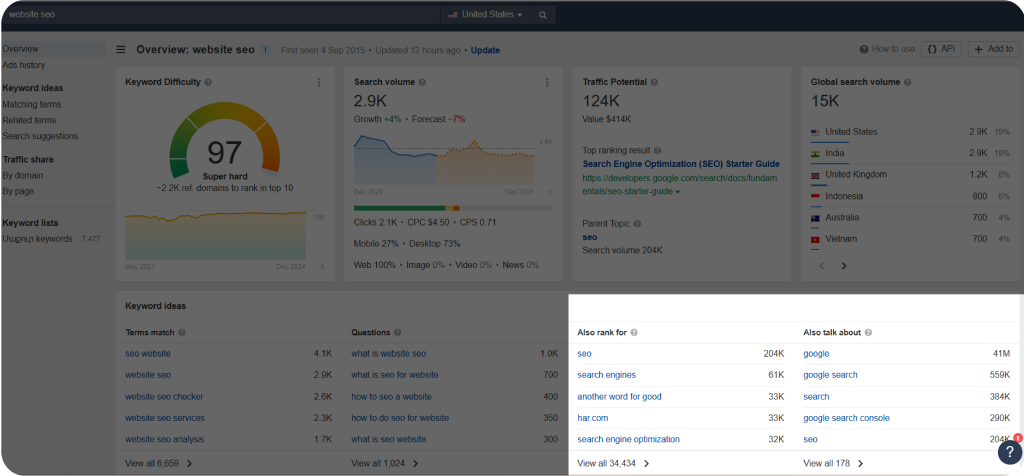
Apart from Ahrefs, we also use Google’s Autosuggest feature to find short tail keywords.
Simply type your target keyword and see what autosuggest gives you.
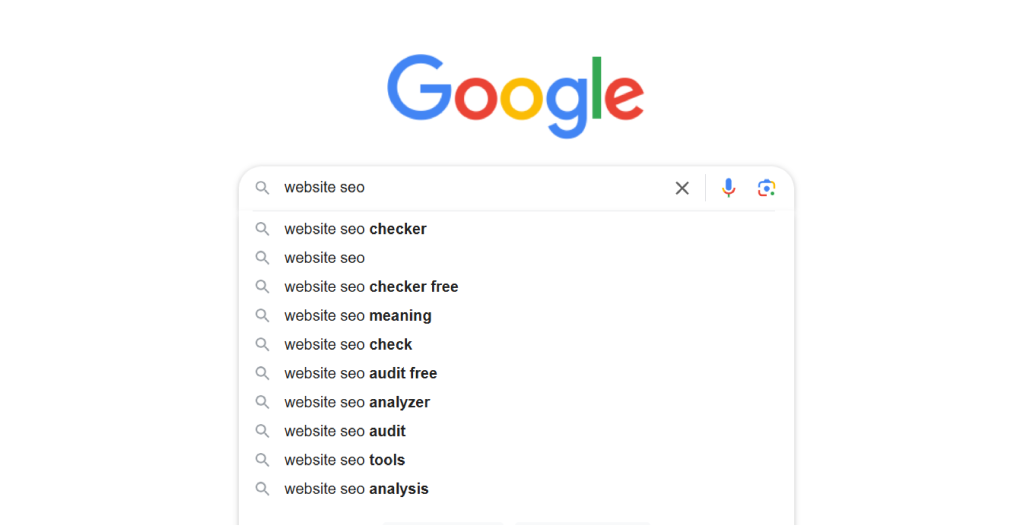
I think this is a great way to learn about the most popular things people search for that include your target keyword, but check them through Ahrefs to ensure their keyword difficulty as well as search volume meet your needs.
Long Tail Tail Keywords
Long tail keywords are long keywords made from 3-5 words with specific search intent.
Again, let’s go back to the cheesecake example.
Previously you’ve searched “good cheesecake” and as we discussed, here the intent is not clear at all and a search engine will show you lots of different results. However, if you search “how to make good cheesecake at home” your goal is clear – you’re looking for a recipe!
Long tail keywords have relatively low search volume and competition levels, which means they’re easier to rank for.
While they might not drive as much traffic as short tail keywords, they often attract highly targeted visitors who are looking for exactly what you offer and are ready to buy.
Further reading:
To find long tail keywords, we recommend using Ahrefs again.
- Type your target keyword into “Keywords Explorer” (e.g. content marketing)
- Under “Terms match,” click View All to find keyword ideas related to your target keyword.
- Set a filter “Word Count” from four words, so you can explore only long tail keywords.
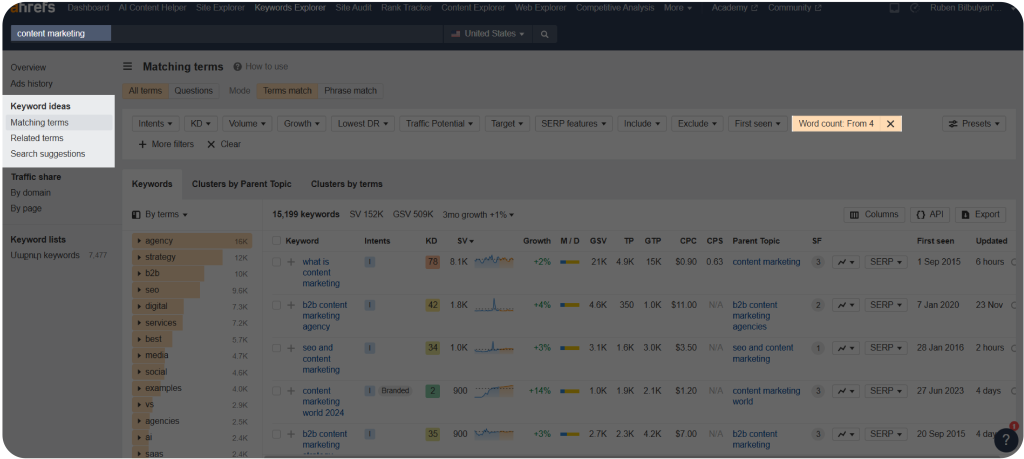
We also recommend checking out “Questions” to find long tail keywords in the form of questions.
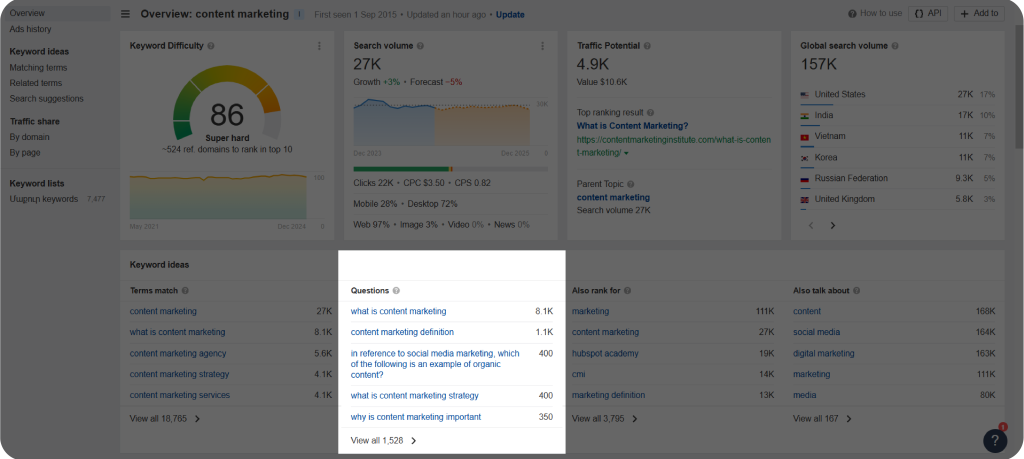
Also, pay attention to the “People also ask” section, as it can also give ideas for long tail keywords in the form of questions.
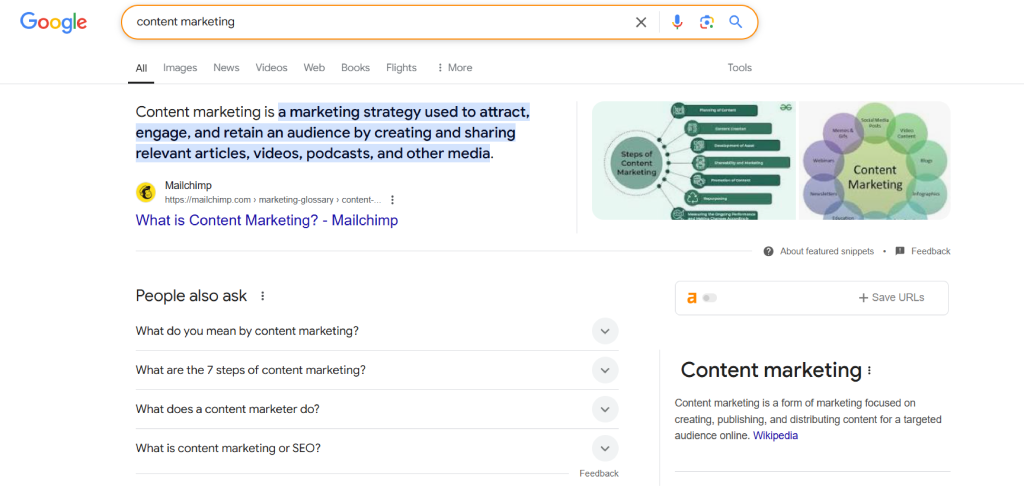
Again, make sure to check these keywords’ metrics to see if they’re a good fit for your content.
Primary Keywords
Primary keywords, also known as focus or main keywords, are the words and phrases around which you want your web page to be created and optimized.
The main purpose of these keywords is to signal to search engines what a specific webpage is all about.
Usually, they have quite high search volumes and this is why they might be the “cause” of lots of organic traffic to your website.
For instance, for a blog post about digital marketing trends in 2025, the primary keyword can be just that: “digital marketing trends”. It clearly shows what this webpage is about and is “generic” enough to attract visitors.
We recommend not just identifying these keywords, but using them strategically. Avoid keyword stuffing but also don’t completely ignore your primary keyword.
To find primary keywords, we use Ahrefs’ Keyword Explorer.
Pro tip: Look for keywords that come with low keyword difficulty and higher search volume.
Ahrefs has recently introduced a new feature that lets you view search intent as well. Keep this in mind!
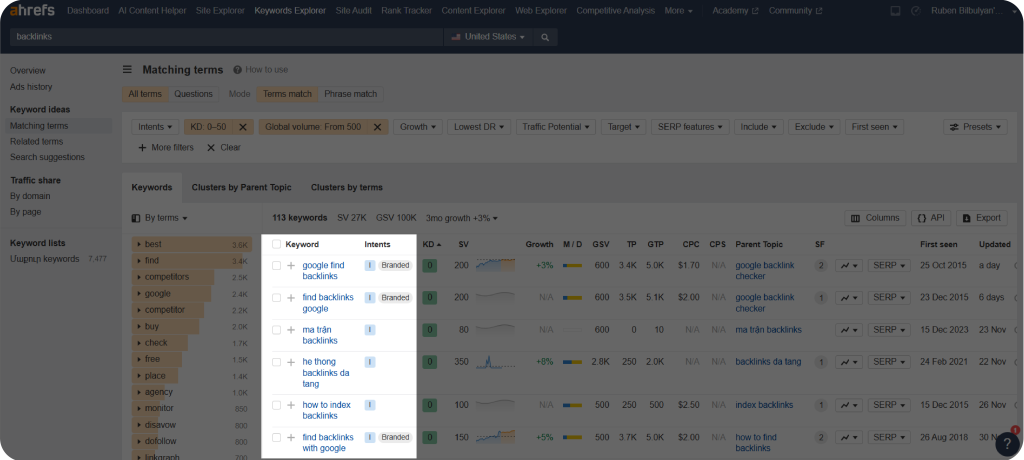
Or, use Google’s Autosuggest.
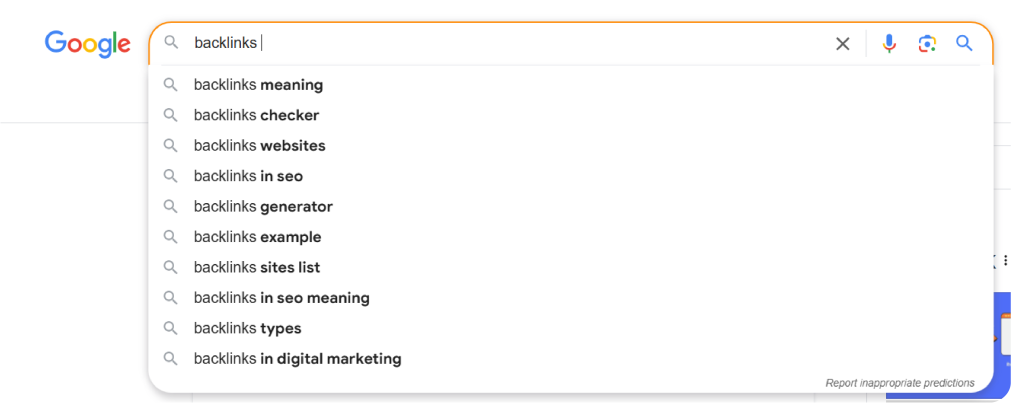
Check out “People also search for” too:
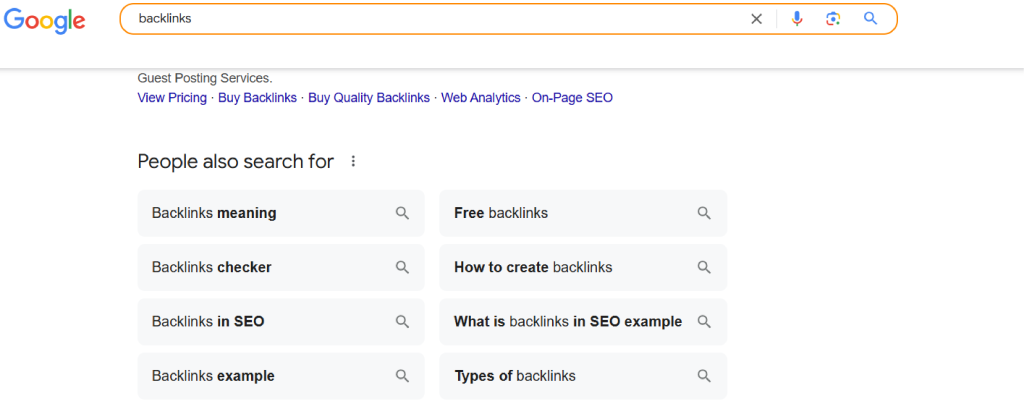
Secondary Keywords
Secondary keywords are keywords related to your primary keywords. They can cover similar topics, relevant subtopics, or even be synonyms of your focus keyword.
They are usually less popular and have lower search volumes, but they are important for your SEO, as they support your main topic and make the purpose and intent of your content more comprehensible for search engines.
So, you attract traffic that is targeted toward a specific query.
Again, if we take this blog post as an example, the secondary keywords might include “keyword categories,” “how to find trending keywords,” and so on.
Note: While you should have only one primary keyword, you can choose as many secondary keywords as you want.
To find secondary keywords, we use Ahrefs.
Explore the “Keywords Ideas” section and choose the ones that best suit the tone and intent of your content.
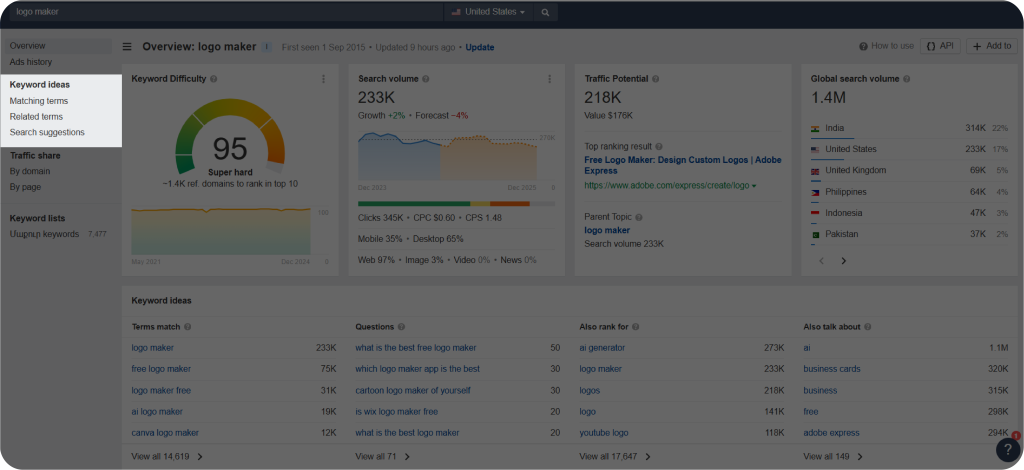
Another thing we highly recommend is to check the keywords of your competitors’ websites—why not see what’s working for them?
Let’s say you are targeting the “logo maker” keyword.
After typing it into Keyword Explorer, scroll down to see what pages rank for that specific keyword, then click “Organic keywords” to explore secondary keyword ideas.
Using either of these methods can help you find secondary keywords for your website and efficiently use them in your SEO strategy.
Informational Keywords
Informational keywords are the words or phrases searched by users who want to learn about something or find guidance on a specific topic.
They are often in the form of a question, starting with “when,” “how,” and “who,” but can also be simple phrases.
For instance, if you search “content writing vs copywriting” search engines know that you probably want to learn the difference between the two and it will show you articles that talk about it and that can help you learn the answer to your question.
Moreover, Google often shows the short answer to such informational questions in their featured snippet section. In the screenshot below you can see exactly what it looks like. To find more informational keywords, you can also explore Google AI overviews or check the “People also ask” section for inspiration.
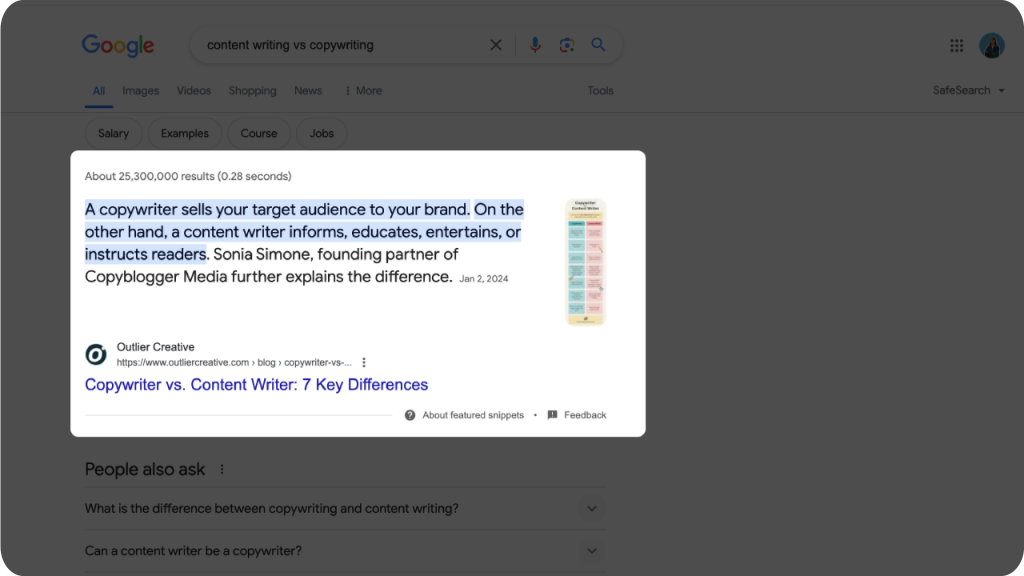
As a business, these types of informational keywords are a way for you to build and establish brand awareness, authority, and trust․ However, they most likely won’t lead users into buying your products and services.
To quickly find informational keywords, use Ahrefs’ Keyword Explorer.
There’s a new “Search Intents” column in Ahrefs showing you common search intents for keywords.
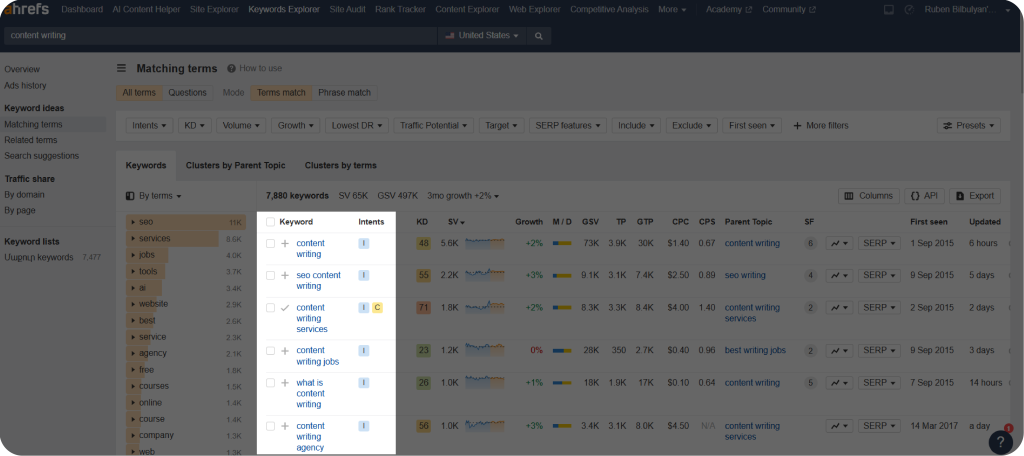
This makes it easy to identify keywords with specific intents, including informational ones.
Commercial Keywords
Commercial keywords are keywords typed by people who are either ready to buy or researching before making a purchase.
This type can include branded types of keywords, keywords that represent your main products and services or even be used for listicles, reviews and comparisons.
“Link building services”, “Starbucks coffee”, “best CRM software“ are all examples of commercial keywords.
Commercial keywords often contain words like “best,” “top,” “cheap,” or “review.” So, using any of these words, you can come up with your own commercial keywords that describe your offerings.
Also, we suggest using Ahrefs to come up with more ideas, but make sure to apply a Search intent filter to find keywords only with commercial intent.
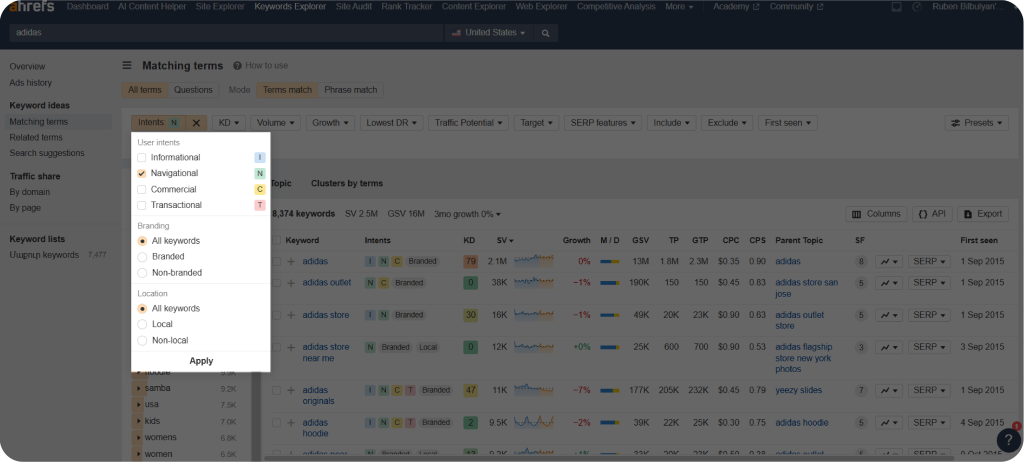
Navigational Keywords
Navigational keywords are keywords searched by users looking to reach a specific website or online destination.
People who use these types of keywords are probably already familiar with the brand and want to find its website, a specific webpage within that website, or even the physical location of a store.
For instance, if you just search “Facebook login” you’re just looking for a login page. Similarly, searching for “Nike store near me” indicates that the user wants to find the nearest Nike store location.
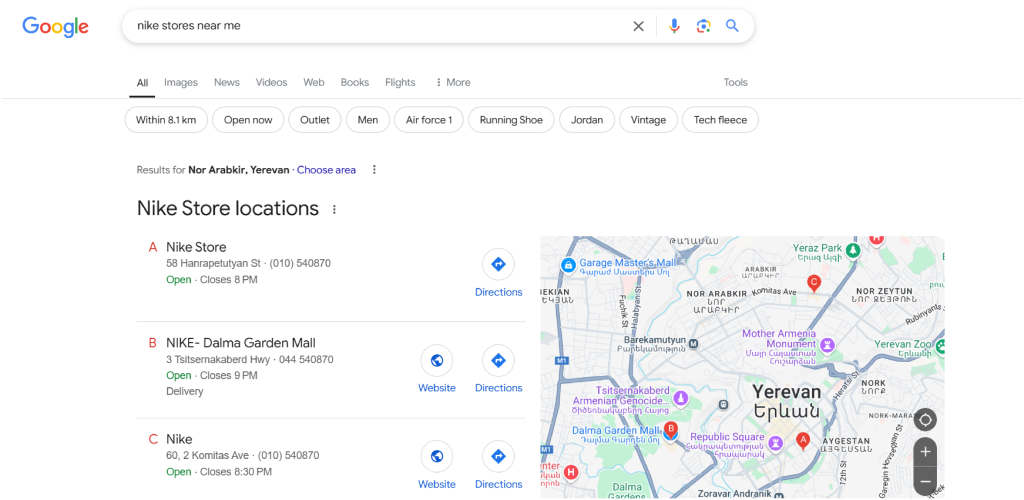
Fun fact: According to SEMrush the most searched keywords on Google are ‘YouTube,’ ‘Facebook’ and ‘WhatsApp web’. Kind of ironic, don’t you think?
If your brand is already well-known these keywords will help drive traffic to your website and they will be easier to rank with as they often contain branded keywords, and who will rank higher with your brand name than you yourself?
Use Ahrefs to quickly find navigational keywords associated with your brand.
Easy, right?
Transactional Keywords
Transactional keywords are search terms that signal a strong intent to purchase or take immediate action.
Usually, the target web pages for such keywords are homepages and landing or product pages that will help the user make the purchase right there and then.
They are the last step a user takes right when they are at the end of the buying funnel after doing some research, weighing their options, and making a final decision as part of a bottom-of-the-funnel strategy.
These types of keywords often include phrases like “buy,” “cheap,” and “for sale” and are targeted when coming up with PPC campaigns. This is why when you search such keywords, you’ll often see a lot of sponsored content.
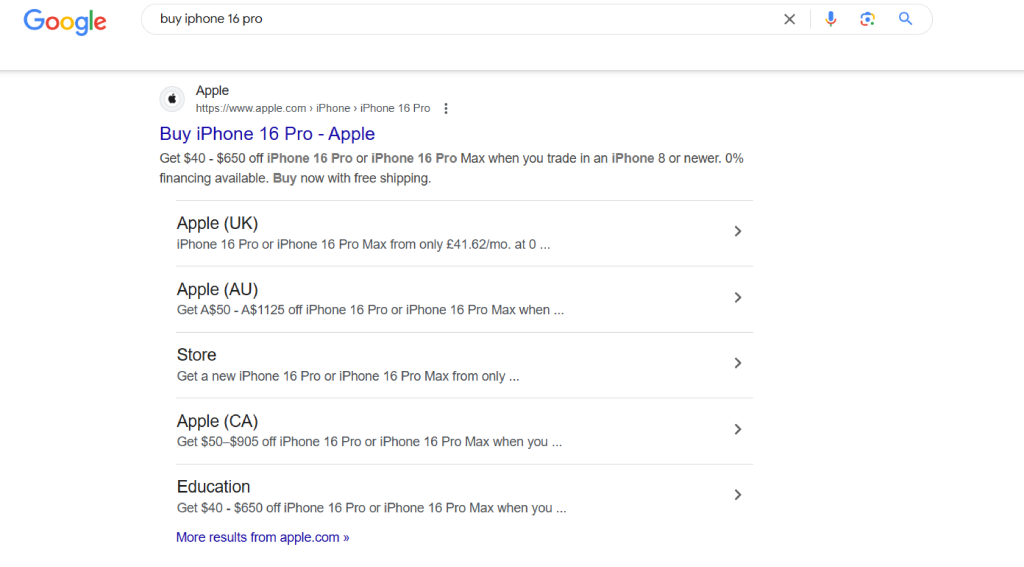
Without identifying transactional keywords and effectively targeting them, your SEO and PPC strategies will not reach their full potential.
To create transactional keywords, we suggest to simply add “buy,” “order,” “sale” and similar keywords to the keywords related to your business:
For more ideas, use Ahrefs.
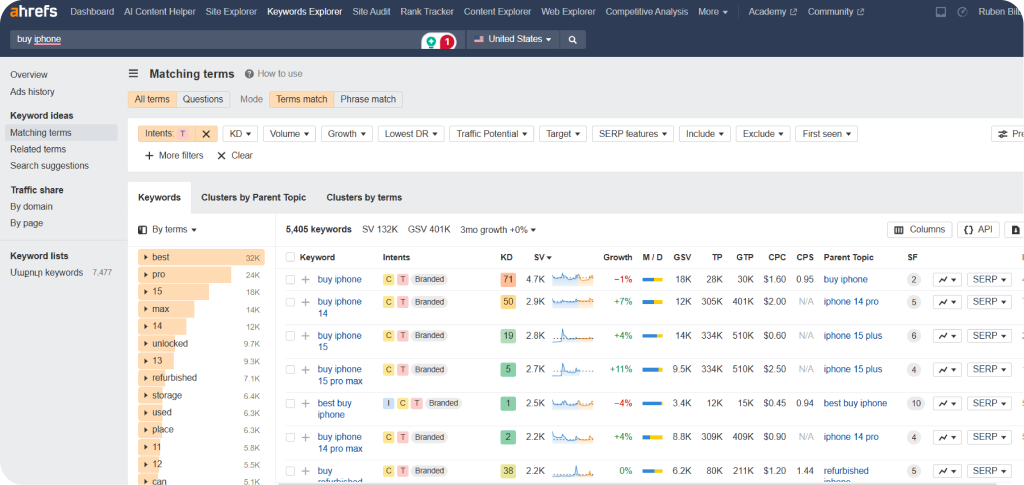
LSI Keywords
LSI (Latent Semantic Indexing ) keywords are words or phrases highly relevant to your target keywords, which are often paired together.
For instance, if your target keyword is “off-page SEO” your LSI keyword might be “backlinks” or “link building”.
LSI itself is a method of gathering information by considering the semantic relationships between words or phrases.
However, according to Google’s John Mueller, LSI keywords don’t exist.
Branded keywords
Branded keywords are keywords that include a brand/product name or a slight variation of it.
For instance, if you search “saynine blog” it’s clearly a branded keyword, as you’re not interested in any blog, but rather want to find the blog of SayNine.
You might think it’s useless to try to rank with branded keywords because if the user searches for them, they are already familiar with the tools.
Well, that’s not actually true.
People who search for such phrases most probably have navigational intent, and if you rank with these types of keywords, which shouldn’t be hard to do as they literally have your name on them, you’ll make it easier for them to find you or the service you provide.
This will improve their user experience and guarantee all the conditions for them to turn into a customer.
Zero-volume keywords
Zero volume keywords are highly specific long tail keywords with no search volume in keyword research tools like Google Keyword Planner, Ahrefs, SEMrush, etc.
Although some people search for very specific things, apparently it can get too specific and not have any searches at all.
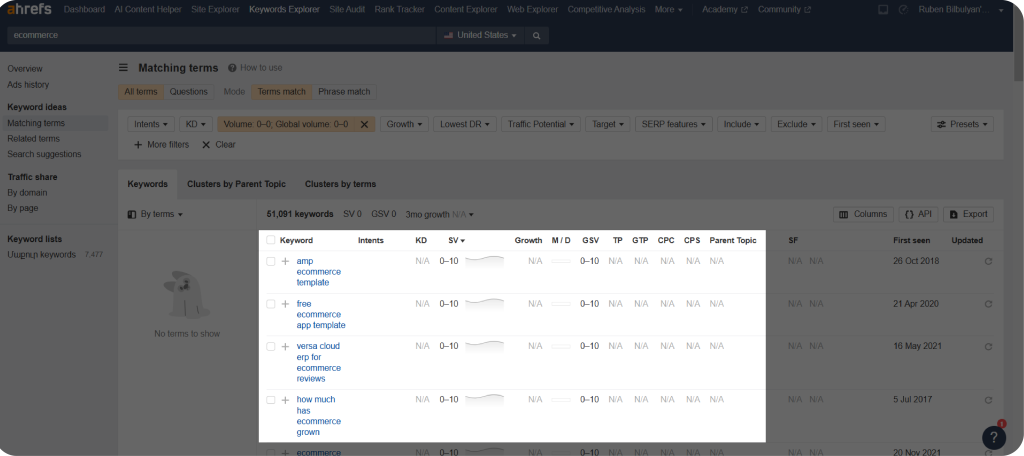
As you can see, the keywords are very specific and they have no searches at the moment.
Although it might be easy to create content around those keywords, as you’ll probably be one of the few or the only people to talk about these specific topics, it still doesn’t mean it will do you any good.
What we recommend is to use a few keywords with good metrics along with zero search volume keywords. Even if these keywords aren’t popular now, they can still attract relevant traffic over time.
The Bottom Line: Keywords Make Your SEO Strategy Work
Let’s sum up what we learned today, shall we?
- Keywords are words or phrases a website wants to rank for in SERPs.
- Keywords are essential in SEO as they are one of the main resources search engines use to find relevant content and show it to users.
- There are different types of keywords, such as short tail and long tail keywords, primary and secondary keywords, informational, navigational, commercial, and transactional keywords, as well as LSI, niche, branded, and zero-volume keywords.
Well, I guess that’s a wrap, I hope you had fun on this little journey and learned something new.
Now, go explore the keyword jungle on your own little traveler!
FAQ about types of keywords
How many types of keywords are there?
There are many types of keywords: short tail, long tail, primary, secondary, commercial, navigation, information, transactional, LSI, branded, and zero volume.
What are the 4 types of search intent?
The four types of search intent are informational, navigational, transactional, and commercial.
What are examples of keywords?
Examples of keywords include short tail keywords like “SEO,” long-tail keywords such as “best SEO strategies for small businesses,” branded keywords like “Nike shoes,” and so on.
Quiz Time
Let's put your knowledge to the test.
Leave your email below to get a SayNine certificate!
Are you sure?












